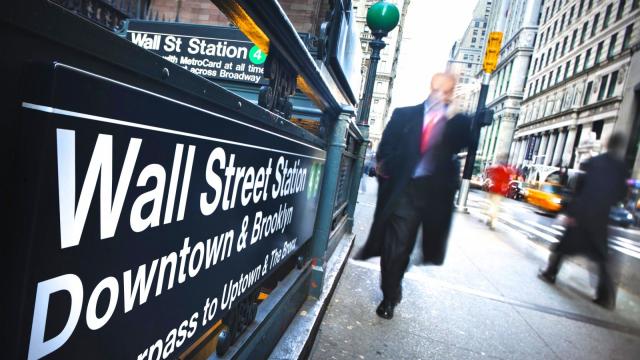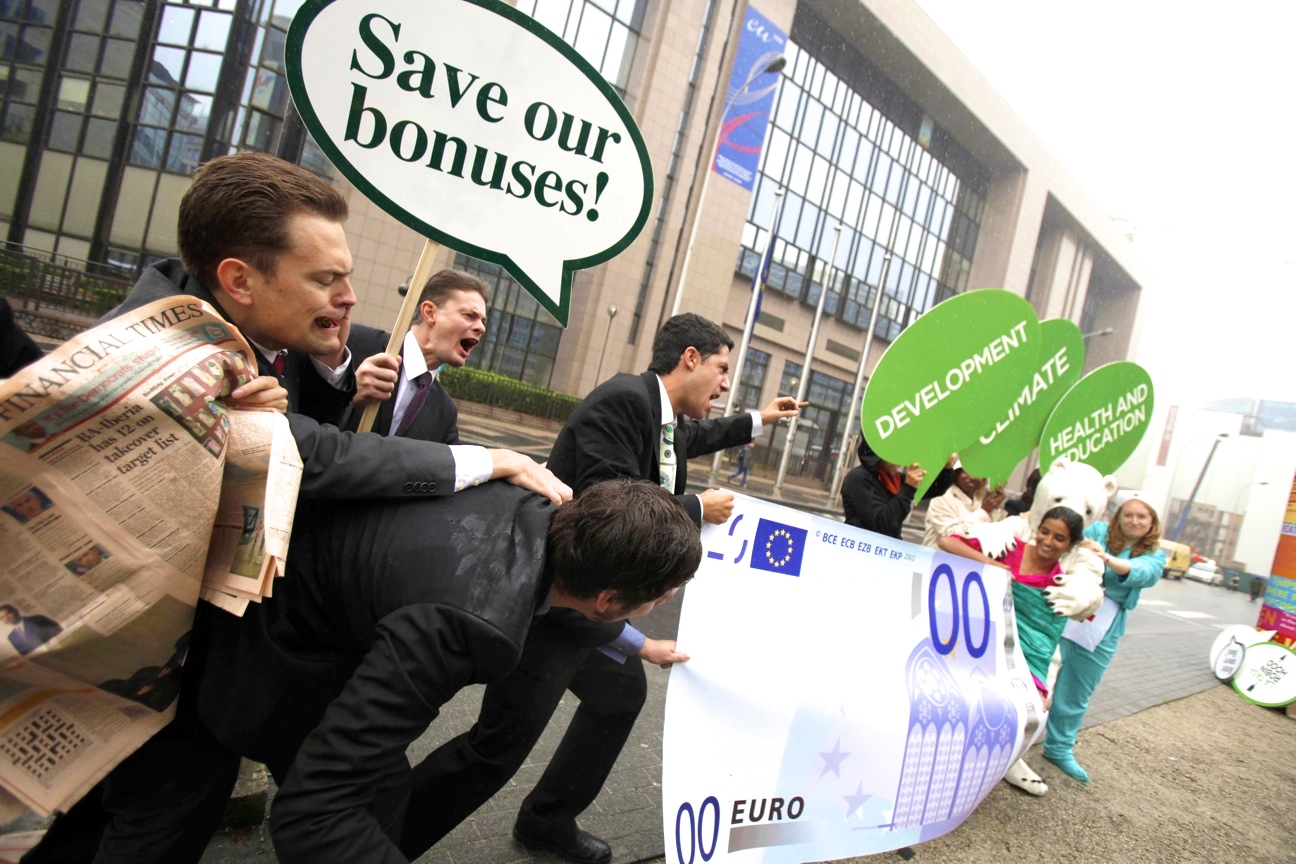
If the global financial crisis has taught us anything about finance, it is not to trust the big Wall Street investment banks. The banks created the crisis, but profited from it. Millions of Americans are still mired in loss, but after a brief setback in 2008, the banks quickly recovered. They have been making money hand over fist ever since.
While wages have stagnated in the rest of the economy, the average New York banker's bonus rose to $164,530 in 2013. That's on top of an average base salary of around $200,000. Wall Street bankers now make more than five times the average New York city salary, compared with less than two times the average in 1981.
Investment banking is nice work, if you can get it.
The bankers' ball almost came to an end in September, 2008. Investment banks Merrill Lynch, Lehman Brothers and American International Group all collapsed within a few days of each other. They all owed massive sums of money to the remaining banks. If those debts had gone unpaid, the rest of the banks would have been dragged under as well.
Then at the end of September, Wall Street pulled off the most audacious raid on the public purse ever contemplated. Treasury Secretary Hank Paulson threatened Congress with financial armageddon and a second Great Depression if it did not immediately provide $700 billion to bail out the remaining investment banks.
It took Congress less than one week to give Paulson his $700 billion - roughly equal to the entire annual budget of the Department of Defense. The investment banks' financial armageddon was averted. From the brink of bankruptcy, the biggest of the big Wall Street investment banks have bounced back to record profitability.
For the rest of us, the second Great Depression was not averted. We are still living it. Just ask the 16.5 million people who are currently unemployed or completely frozen out of the labor market. Or the 7.1 million who want full-time employment but can only find part-time jobs.
Why did our government bail out the banks instead of stimulating the economy as a whole? When Hank Paulson was appointed secretary of the Treasury in 2006, he was the CEO of the most powerful investment bank on Wall Street, Goldman Sachs. He spent almost his entire private sector career at the firm, acquiring a fortune of some $600 million in the process.
He had to sell his Goldman Sachs stock when he became Treasury Secretary, but he didn't have to sell his Goldman Sachs mindset. Hank Paulson brought with him to government the knowledge, prejudices and ways of thinking of a powerful Wall Street insider. Once a banker, always a banker.
Or perhaps that should be once a gambler, always a gambler. Hank Paulson didn't come out of the staid world of the community banker, making small loans to local businesses. He came out of the big business of Wall Street investment banking.
It has often been said that Wall Street operates on the principle of "heads we win, tails you lose." Of course it's not as simple as that. But it's not much more complicated.
Once upon a time, investment banking meant finding financing for long-term investments in industry and infrastructure that could not be met through ordinary bank loans. Those days are long gone. Today the time horizon of the investment banks is very short. Sometimes it can be mind-bogglingly short.
For example, big banks now "co-locate" their trading computers in the same rooms as the computers used by the stock exchanges to execute trades. This allows them see stock prices a few milliseconds before the rest of the world, since even electronic signals take time to get from the stock exchange to your computer.
Their co-located electronic trading platforms give investment banks the opportunity to snatch up attractive offers before real investors ever get to see them. The bankers themselves don't even see them. Their pre-programmed computers - installed literally on the same racks as the stock exchange computers - trade against you automatically.
Automated trading is the technological cutting edge of what investment banks do, but most of their activities fit the same pattern. Investment banks make enormous profits by skimming pennies off the top every time financial instruments are issued, traded, or retired. They may make mere fractions of a penny. But all those fractions add up.
The big banks can double or triple these gains by working with money that they borrow overnight at very low short-term interest rates. They also lend these funds out to companies for a few days or weeks at a time on a variety of financial markets. Again, the pennies add up.
The result is that investment banks are assembly-line money machines. They practically print money. They make profits that are inconceivable in any other line of business. And they make them consistently, year in and year out - until there's a crisis.
That's where the gambling comes in.
Under ordinary conditions, the investment banking business model results in a consistent, almost risk-free flow of ill-gotten gains. In a normal year, investment banks can't avoid making money. It takes serious employee fraud or systems failure to bring down an investment bank.
When a crisis hits, short-term interest rates shoot up. Companies that used to roll over their routine obligations have trouble finding new financing. Investors who sold options can't deliver the goods. Stock prices start to move unpredictably. And investment banks collapse.
The big Wall Street investment banks make their money by playing an endless casino game in which they reliably win millions of small bets but occasionally lose big - very big.
In the 2007-2009 financial crisis, the losses were so severe that every major investment bank on Wall Street should have collapsed. In reality, every one of them did collapse. They only stayed in business because Paulson and Federal Reserve Chairman Ben Bernanke came to the rescue.
In March 2008, investment bank Bear Sterns collapsed. Except it didn't collapse. It was rescued by an emergency loan from the Federal Reserve and then sold to JP Morgan Chase. Investors who owned Bear Sterns stock in their retirement funds lost nearly everything. Bear Sterns bondholders and counterparties - i.e., the investment banks that had lent money to Bear Sterns - lost nothing.
In September 2008, investment bank Merrill Lynch collapsed. Again federal financing was used to underwrite a fire sale, this time to Bank of America. Again, the bondholders and counterparties - the other investment banks - lost nothing.
Also in September 2008, Lehman Brothers collapsed. Unlike Bear Sterns and Merrill Lynch, Lehman brothers actually declared bankruptcy. Within hours, the Federal Reserve stepped in to provide $138 billion in emergency financing to make sure that Lehman's obligations to its trading counterparties - the other investment banks - were paid that night. Ordinary investors in Lehman Brothers lost nearly everything.
Also in September 2008, American International Group (AIG) collapsed. This time, the Federal Reserve stepped in before the company declared bankruptcy, lending AIG $85 billion in a sweetheart deal. When the Congressional bank bailout money came through, Secretary Paulson gave AIG a further $45 billion subsidy.
The list goes on. The US Treasury gave $45 billion to Citigroup, $45 billion to Bank of America, and smaller amounts to other banks and financial firms. The Federal Reserve lent similar amounts, more quietly and with no legislative strings attached. Without support from the Treasury and the Federal Reserve, every investment bank in America would have disappeared in 2008, and good riddance.
Even the fabled Goldman Sachs - the firm that Hank Paulson ran before being appointed secretary of the Treasury - would have folded many times over. It may not have invested in toxic subprime mortgages, but it lent money to banks that did. When those banks went belly up, the Treasury and the Federal Reserve stepped in to make sure Goldman Sachs got paid.
To be clear, most of the bailout money has been repaid - with interest. Contrary to popular perception, the bank bailouts didn't just give money to the banks. It lent money to the banks. Put that way, maybe it doesn't seem so bad.
Except that it is that bad. The modern investment banking business model is based on levying a small but continuous tax on everything else that happens in the economy. It is in effect a financial transactions tax, but instead of the tax being collected by the government, it is collected by a cabal of big Wall Street banks.
Without government support, the investment banks' private financial transactions tax would not be sustainable. When a recession hits and tax revenues decline, governments stay in business by borrowing heavily. Investment banks that levy a financial transactions tax must be able to do the same - or collapse into bankruptcy.
That is how a recession turns into a financial crisis. Recessions occur in the real economy. Financial crises occur among big investment banks. That's why countries like Canada and Germany don't even have financial crises. No Wall Street, no crisis.
The 2008 financial crisis came almost a year after the beginning of the recession in 2007. The financial crisis didn't cause the recession. The recession caused the financial crisis. Without government-subsidized financing for investment banks, the next financial crisis would be the last financial crisis. Game over for the investment banks.
Why wait for the next recession? There is an easy way to kill the investment banking business model right now - and prevent the next financial crisis from happening at all. Instead of letting the investment banks collect a private financial transactions tax, we can close the casino by enacting a public financial transactions tax.
A federal financial transactions tax would raise between $83 billion and $132 billion under a range of scenarios examined by the Congressional Research Service.(6) It would also kill the goose that lays Wall Street's golden eggs. Or to be more accurate: It would draft her into the public service.
If the next president has the courage to push a financial transactions tax through a reluctant Congress, be prepared to hear some very loud squealing. But it won't be the goose squealing. It will be the bankers.
3 WAYS TO SHOW YOUR SUPPORT
- Log in to post comments
















